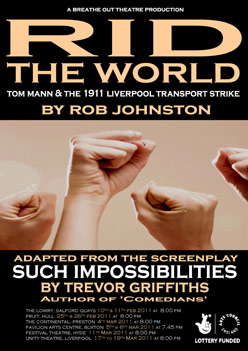
| HOME |
| NERVE |
| REVIEWS |
| ARCHIVE |
| EVENTS |
| LINKS |
| ABOUT US |
| CONTRIBUTORS |
| BACK ISSUES |
| CONTACT US |
 Rid the World
Rid the World
Written by Rob Johnston, Directed by Ed Barrett
Breathe Out Theatre
Unity Theatre, 17th - 19th March 2011
Reviewed by Ritchie Hunter
Credit is due to all those involved in bringing this play to the Unity Theatre. There were some deep questions explored here, about the role of the union leaders and the dynamics of the personalities involved in the 1911 Transport Strikes. There was also a question and answer session afterwards between the audience and the production crew.
It is hard to work out, though, what this play was trying to achieve. If it was to give us an understanding of what happened, then I suspect only those with prior knowledge of the events would have followed all of it. Any play about a popular uprising must try to educate and enthuse as wide an audience as possible to draw out the lessons for the present. It would be interesting to find out how many of this audience came away with a clear understanding of the events of 1911, never mind the messages they hold for us now.
There was a failure here to tell the stories of the mass of workers who took to the streets and organised on the front line.
A hundred years ago, in a series of rolling strikes, one body of workers after another won concessions from their employers. The traditionally separate bodies of workers: seamen, dockers, carters, railwaymen and tram drivers, was broken down and a city wide solidarity led to Liverpool being controlled by the strike committee; in effect a workers council.
When thinking about workers occupying and running a city, the song by Alun Parry about the Limerick Soviet springs to mind, when in 1919, as a reaction to harsh British rule, a strike committee was elected to control Limerick.
The 1911 events are just as important in our history and, if they had happened after the 1917 Russian Revolution, would surely have led to a Liverpool Soviet.
Some sense of this could have been achieved by a using a backdrop of images of the time (see Nerve 1911 Calendar). Not having this link to the mass of workers meant that the main characters came across as individuals, and a bit stereotypical.
Tom Mann, the earnest thinker, who professed inclusion but seemed to take decisions on his own, came across as all knowing to the point of boring. That he must have been going though turmoil trying to co-ordinate events in the ‘organisers graveyard’ of Liverpool, was only shown fleetingly. He did at one point say, jokingly, that all he wanted to do was work a vegetable plot.
James Sexton was the typical union officer, jokey and brash, but basically weak, following the official union leaders line.
John (George) Milligan, the unofficial dockers’ leader was portrayed as a head strong, fist fighting unco-operative man with a heart of gold.
For all this, I enjoyed watching the play, there were some funny scenes, it kept the audience interested, and it stimulated a lot of useful debate.
See also review by Jeremy Hawthorn
Could not open file